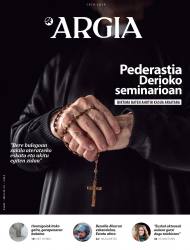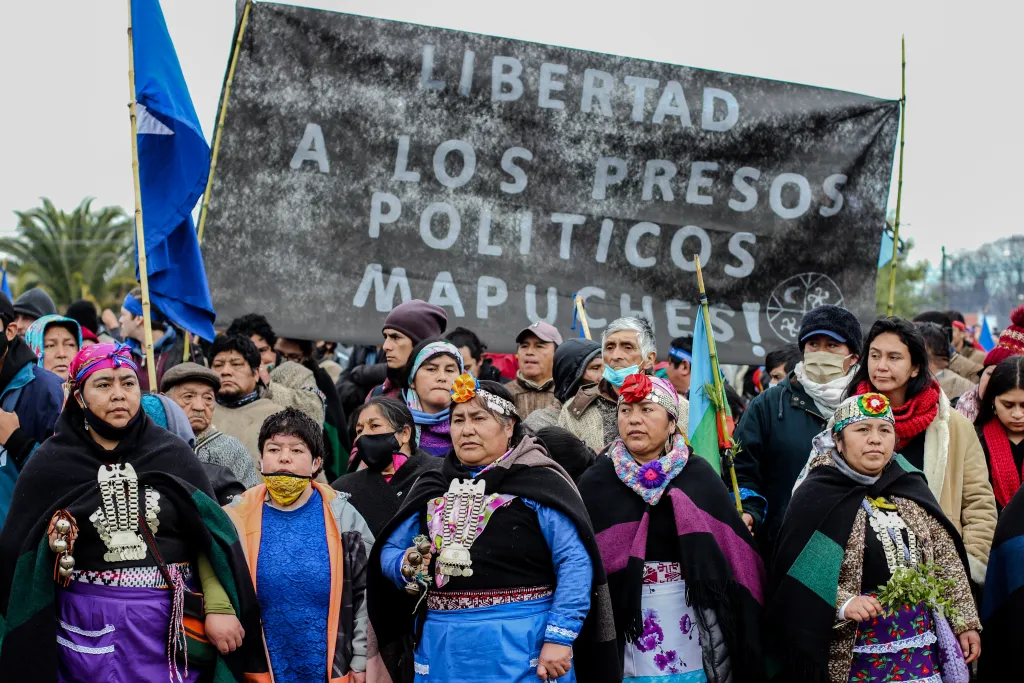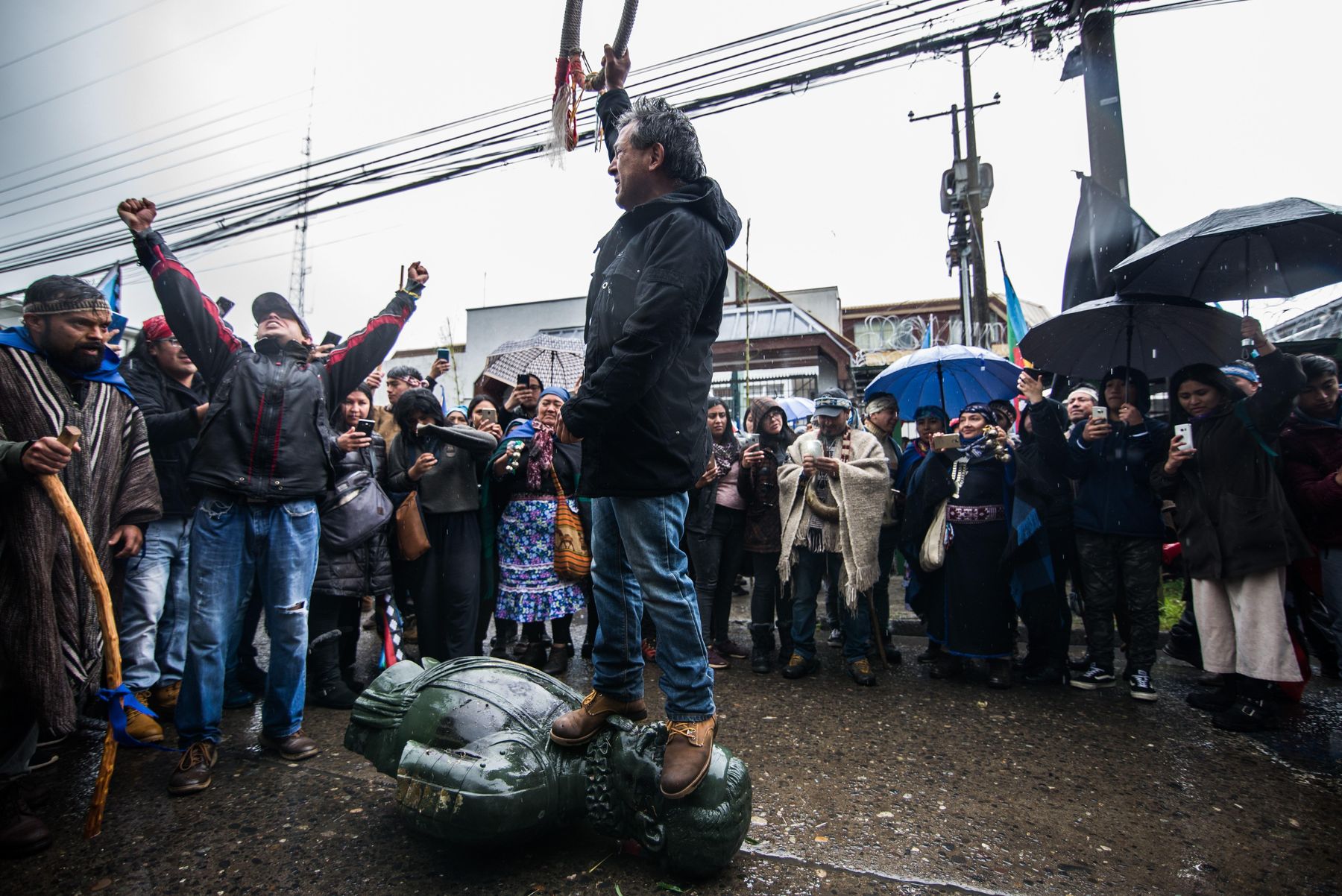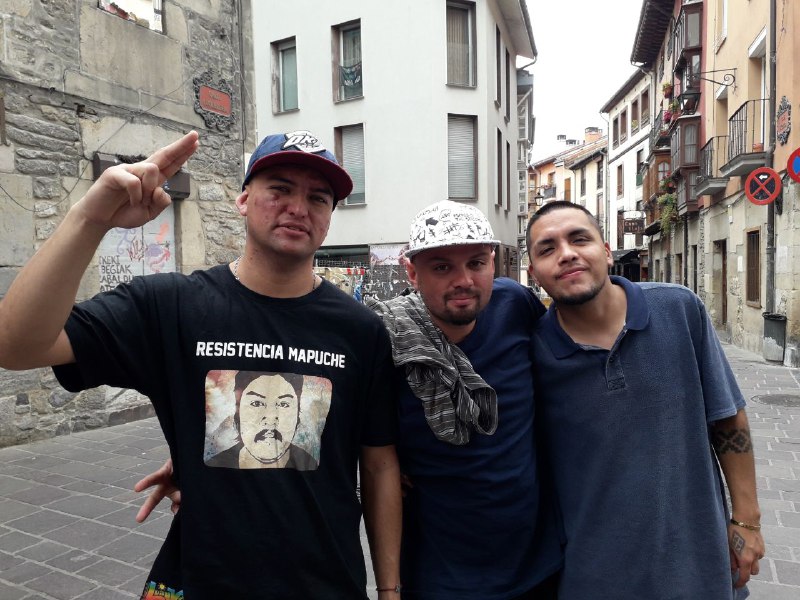"My mother tongue is Spanish, but it is not our language"
- The Mapuche Sergio Marinao attended the Garabide Expert course in autumn. Coming from the Mapuche of Chile and the Wallmapu, his eyes traveled around us every day. At the time of farewell, a young man who learned his way of Mapuche told us about the people and the language of the Mapuche.
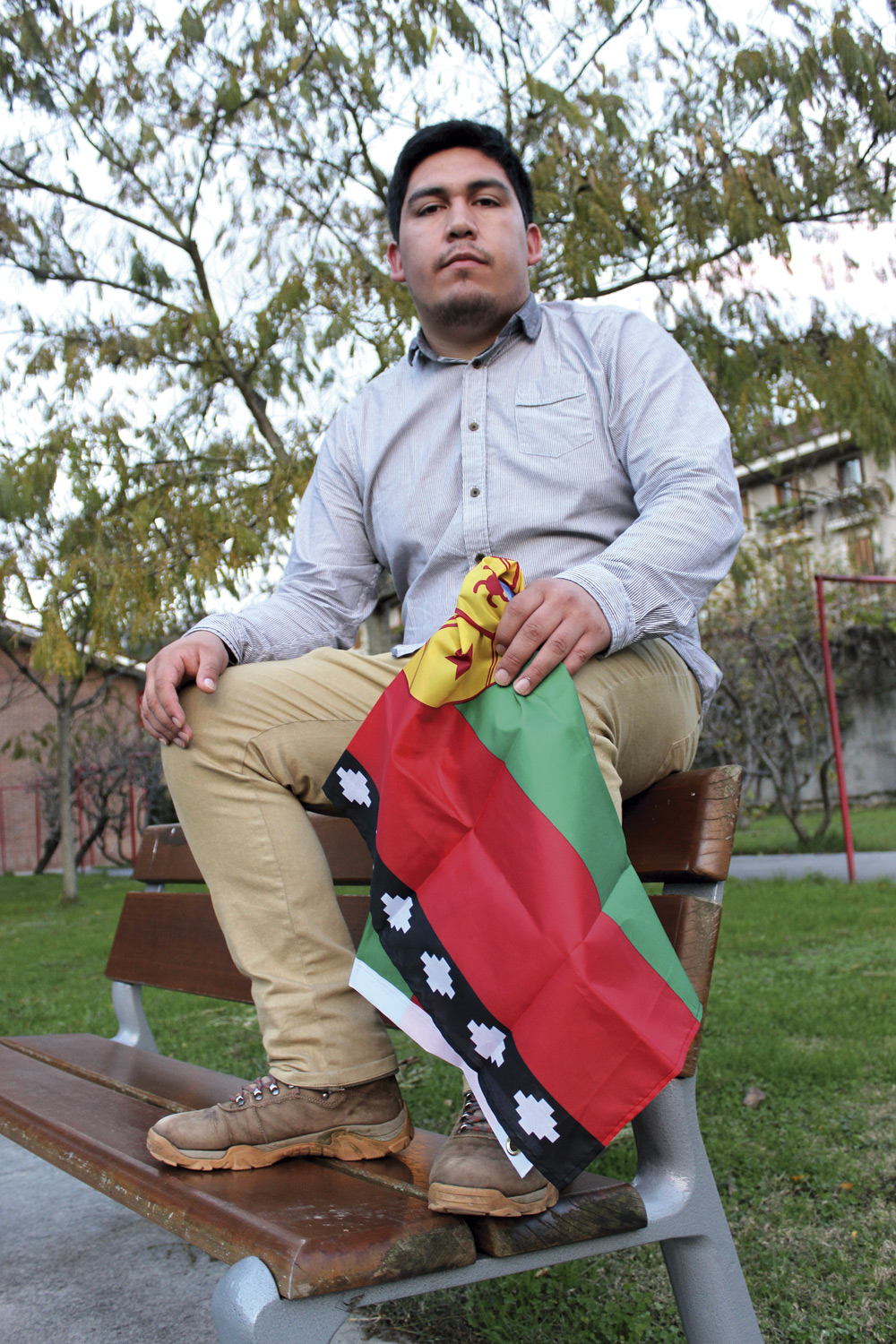
Maputxe lafquenchea, “itsasoko maputxea”, Ozeano Barearen itsasertzean jaioa. Jatorrizko hizkuntza mapuzuguna bere gisa ikasitakoa. Mapuzugunberria, eta euskaldunberri izateko bidean. Irakasle ikasketak egiten ari da eta, aldi berean, Maputxe Hizkuntzaren Nazio Institutuko kide da. Militantea. Maputxe herriaren banderapean egin ditugu elkarrizketa nola argazkiak.
Sergio Marinao.
That's it. [He's in Basque]
He knows a little about Euskera!
Yeah, a little bit.
How have you learned?
In the Basque Country. I'm an Euskera student.
But you have very little time here!
Yes ... [The following have been done in Spanish]. I've been around for a month and a half. But if you try hard, by compromise, you get a lot. I am in this land, in Euskal Herria, three months, and because of the respect I have for this land, I have decided to learn in Basque what I can, little or much. And also because of the concordance with the struggle that we maintain. That is what we would like there, for people to respect our tongue of land. Being here, I did nothing but show our desire through practice. Practice is always better than empty words.
You, who are a stranger, who are temporary, learning Basque. However, many of those who live here do not.
I know, yes. I've been to Ipar Euskal Herria three times, I've met people who live there a long time, and I haven't been able to do basic interviews in Euskera. I was struck.
If so, does this happen?
Much more. In Chile and Argentina, many are unaware of the language of the land in which they live. The Mapuche speakers who live in the villages are aware, yes, but those of the cities have zero linguistic awareness. The very presence of the Mapuche language in the cities is also zero.
Where does the name come from? Sergio Marinao.
My name is Marinao, Mapuche. For my mother, I have her in Nahuelpa. You have the names of my ancestors. When the Spaniards came to Mapuche lands, they respected the autonomy of our people, at least in part. However, when the national states of Chile and Argentina emerged about two hundred years ago, it ended. The soldiers invaded the Mapuche lands. Not only did the earth take us away, but also the language. They carried out the cultural assimilation. Likewise, when the population census was conducted, the Mapuche were also required to register. My great-grandfather was Marinao, simply, but they called him a Christian. “From now on you will be called Manuel Marinao,” they told him. My great-grandfather had two brothers, one was called Waikinao and the other Ekiñenao. They were from the Nao family. With the census system, they changed their names. However, to this day, people have already started naming mapuche. There's something.
You mentioned the invasion.
Yes, the military invasion of the armies of Chile and Argentina. The army chiefs are heroes in their states, while for us they are genocides. As I said before, the Spanish crown partly respected the Mapuches. Even in the era of colonization, the Mapuche could not be invaded and instead of perpetuating the conflict, he preferred to sign a peace treaty. Territorial limits were also determined.
In the era of emancipation, when the national states were created, the elites were the protagonists, that is, the children of the Spanish leaders born in America. Among them you have San Martin, Bolibar, Higgins and others. The Mapuches preferred to be subject to the Spanish crown rather than under those elites, as the Spaniards respected the rights of the Mapuches – always as signed in the peace treaties – and the elites did not. Over time, a false national identity was invented in Chile. The Mapuches, as the base of the national identity of the country, extended to the four winds. They built a historical lie, and they still maintain it, negating the Mapuche reality.
What does the Mapuche people base their identity on?
It's based on Earth, on Wallmapu, and implicitly on language -- at least while we've kept the Mapuche. Today, it seems to me that without language we cannot maintain our identity. I belong to the language movement and I believe that, above all, identity is linked to territory, but also to our thinking and culture. However, based on the mapuche.
Does the Mapuche have vitality?
I live in the part of Chile and I know about it. A sociolinguistic survey conducted more than a decade ago determined the number of talking mapuches that live in three counties: Biobio, Araukania and Los Ríos: 250,000 speakers. Most of them are elderly. Children and young people don't talk about maps. That is, there is no transmission between the knees.
On the other hand, the invasions led the Mapuches to lose 95% of the earth's surface. It was, of course, a program to reduce indigenous people, a copy of the program to reduce Native Americans. Land reduction meant condemning Mapuche to poverty and migrating from towns to cities. The language has also regressed with the people, it has been relegated to rural areas, where only the elderly speak.
On the other hand, according to the last census, we are a million Mapuche in Chile. Six hundred thousand of that million live in the vicinity of the metropolis of Santiago, the capital of Chile, thus separated from Wallmapu. A diaspora, let's say, but they're much more in that diaspora than in Wallmapu.

In one way or another, you are organised. He just mentioned the movement.
We are the National Institute of the Maputxe Language. We're in Temuco. Temuco is the most important city in Wallmapu, in the Araukania region, with some 200,000 inhabitants. We're also talking about Conception. We're 25 people working. Fifteen, I would say that we are active entrepreneurs. The rest, partners, more or less collaborating. We are students, workers and, at the same time, we are working for language. On the other hand, in Araukania itself, you have the Pro Mapuzuguna Movement, which is directly asking for the official language in the region. However, our institute is the only one working for the teaching of language.
Is it possible to recover the language?
They say that desire is power, and we are convinced, to begin with, that it is possible. However, a lot of work would have to be done. We know what the tasks are, but we cannot address them all. It would take state policies, implementing language in educational centers, applying the model of immersion... However, these measures are far from our reality.
The Government of Chile does not understand that. The school is also unique cultural. Chile is a very large country from south to north, very different from one place to another, but where the same school model reigns. The territorial adequacy of education is therefore difficult, and mapped teaching is impossible.
So things are, we work non-formal teaching through our movement. We have been working for three years and we have succeeded in getting some people to learn the language. We have achieved more than state programs, as the state launched a project similar to model A in school twenty years ago, and that program has not created a single speaker. We, on the other hand, have succeeded in ensuring that the speaker who knows nothing about maps is able to speak with competition.
You said that students learn to speak of maps in three years. I wanted to ask him about learning disabilities.
There are variables. Personal motivation, for example, or the time you spend daily on learning, for example. I started learning from scratch, when I was 18, at the heart of the family, because most of the speakers are speakers that we have. The broadcast also failed in our house and, on the other hand, I did not have the opportunity to receive classes on the maps, nor to go to the language barnetegi. I learned for myself.
On the contrary, the one who is now starting to study will have a level higher than the basic level in two or three years. We teach classes once a week. You have the least. Of course, everyone has to learn at home as well, and above all we underline that work, that of home. We have no other resource. The professor does not charge, he does so voluntarily. And yet, people are learning, empowering and reinforcing the movement.
"In vain we will say that the Mapuche belongs only to the Mapuche: it corresponds to the Chileans and Argentinians who are in our lands"
As you said, it is not a speaker who has been mapped by birth.
No, as a young person, I've learned our language, in my own way. My birramone was a Mapuche speaking monolingual. He never learned Spanish. I had grandparents, I had bilingual. For example, grandpa, the speaking monolingual we have on the map, has become bilingual thanks to the missionary school. My father was monolingual. In my house, we didn't talk about maps. We are three brothers and nobody else today than I have learned from the maps. My two family members sympathize with those of us who work in language, but they have other priorities. In Mapucheo society has some basic priorities that are not the recovery of the language: poverty, alcoholism… Many speak about the Mapuche because they only know or because it is easier, but they have no linguistic awareness. Although they are not able to speak correctly in Spanish, they prefer to speak in Spanish in one way or another than to speak in the right Mapuche.
How did you learn it?
Talking to you and your father's grandmothers, who are active speakers. They live in rural areas. Today, I go there, I spend three days, and I'm just talking about maps. Young people, on the contrary, are in the city, in the university, in public transport -- we want to talk about ourselves, we have the right to do so, but it's not easy.
Does Castilian consider its language?
No. Spanish is not our language. My mother tongue is Spanish, but the land of the language my ancestors have experienced is Mapuja. And I'm linked to my ancestors, united to them. Mine is Mapuche, not Castilian. We need linguistic normality, and, in this case, it is not normal for a language to arrive in a territory that does not have its own and is imposed there, let alone condemn to death the local language in order to dominate it. That is what Spanish has done. I will not accept it, I will always oppose it. First, speaking in my own language, learning and speaking the language that has taken me away.
What about the non-speakers that we have on the map?
To begin with, we also teach non-Mapuche people. So far, the Mapuche has been directed to the Mapuche, but in the historical territories of the Mapuche several different people coexist, so in vain we will say that the Mapuche does not belong to anyone other than the Mapuche, but to the Chileans and Argentinians who live in our lands. That's what I've done when I've come here, to learn Basque, what I've been able, out of respect, out of concordance with the land that I live in. In our country, we teach you the language when it comes to learning, whatever its origin. We are to come together, not to make deductions. They say we're about 250,000 speakers, optimists. We are therefore not in a position to exclude anyone.
I read that in twenty years the Mapuche could disappear. That is in danger...
It's been a hundred years since they say that, that the Mapuche is about to disappear. There is globalisation, and the damage that has been caused by globalisation, the disappearance of one language to another. In our institute we have seen that the situation is vital: either we sign the death of the language, or we begin to revitalize. We know that many of the things we dream about language are never going to see them, but it motivates us to put a solid foundation for the future so that future generations have a future. We take care of it, no one else than us will do it for us. Either we do it, or then the mapuche is lost.
“Itxaropena eman dit Euskal Herriak. Duela 50 urte, euskarak gaur egun mapuzugunak bizi duen egoera bizi zuen. Biziberritzea ikusi dut, arrakasta. Gu, berriz, ‘Ahal dugu!’ esateko moduan gara. Garabideren hizkuntz lankidetzarako Aditu ikastaroak bihotz eman digu hona bildu garen hizkuntza guztioi: izan maia, nahua, guarania, kitxua, edo mapuzuguna”.
“Santiagoren tamainako espaziotzar handi batean komunitatea osatzea zaila da oso. Zazpi milioi biztanle omen dira, eta hizkuntz komunitaterik osatzeko modurik ez dago hainbeste milioiren artean sakabanatuta dagoen jendartean. Egitekoak hamaika dira, baina gure mugimenduaren arabera, Wallmapun bertan indartu behar dugu mapuzuguna”.
One of the main conflicts of Chilean President Gabriel Boric since the beginning of his mandate has been the conflict in the territory of Araucania in the south. In recent years, the struggle between the Mapuches and the Chilean state, among others, for land ownership has... [+]









